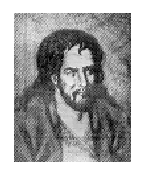
| Shams al-Din Muhammad Hafiz
copyright 1979 |

| Shams al-Din Muhammad Hafiz
copyright 1979 |
Khwajah Shams al-Din Muhammad Ibn-i Muhammad, known as Hafiz, was born into a merchant family of Shiraz, Iran, some time between 1321 and 1326; he died in the same city around 1389. The word "hafiz" means reciter. The poet chose this takhallus because, allegedly, he could recite the Qur'an in a number of different forms--fourteen according to his own poetry and seven according to his colleague and biographer, Muhammad Gulandam.
Little is known about the formative years of Hafiz's life other than that he was orphaned at an early age and was employed by a baker as dough maker. He also may have worked as a scribe, a teacher, and a scholar. If his poetry is an indication, he must have received a solid education in Persian literature, sciences, and Arabic.
At the time when Hafiz's fame as a major poet was gaining recognition, the province of Fars was ruled by the Muzaffarid dynasty that had displaced the relatively unstable Inju dynasty. The Muzaffarid ruler Shah Shuja', however, was not particularly interested in either Hafiz the man or his poetry. Neither were the Timurids who displaced the Muzaffarids prominent supporters of Hafiz.
As a young man, Hafiz participated in the literary gatherings of shop keepers, artists, and other professionals and perfected his poetic craft. In this respect, two trends are important. The circle of the rinds which boldly criticized the government and the gathering of the malamatis who blamed themselves for the suffering of people multitude. Hafiz mingled with both groups and openly sympathized with their points of view.
Unlike his globe trotter fellow Shirazi, Sa'di, Hafiz stayed in Shiraz almost all his life. One of the two trips that he made was forced upon him--he was exiled from Shiraz due to mass opposition to his singular behavior. He stayed long enough in Yazd until the situation cooled down. The other trip was to the port of Hormuz on the Persian Gulf where he was to travel to India. A stormy sea made him change his mind and return to Shiraz.
Like the Quatrains of Umar Khayyam, Hafiz's poetry has a special public appeal. This appeal is to a degree that his diwan is often treated as if it were the holy Qur'an. Indeed, to most Iranians he is known as the Lisan al-Qaiyb (tongue of the unperceived). In fact, like the Holy Qur'an, they use his diwan to look into the future. Hafiz's diwan contains 418 ghazals, 5 odes, 41 quatrains, and 3 small mathnavis. Other features of his diwan include the Saqinameh, Ahuye Vahshi, and Muqanninamah.
Hafiz is undeniably the master of the art of the ghazal (sonnet). The ghazal, of course, does not begin with Hafiz but, it is, certainly, a genre which he developed and perfected. His Sufic ghazals usually contain seven beyts with the poet's penname usually appearing in the last beyts. His Sufic ghazals, that have more than seven beyts, have, over the centuries, engaged the attention of the analysts and Hafiz interpreters. It is not clear whether the beytsthat fail, in one way or another, to meet Hafiz' standard, thematic development, and the seven-beyt-limit are added by later compilers who, for various reasons, might have amplified the volume, or that they had been added by Hafiz himself to satisfy the demands of his patrons.
Hafiz is a highly controversial figure in Persian literature. The controversy is centered on whether Hafiz uses allegorical symbolism alongside profane love to convey Sufic messages to those knowledgeable to decipher his thoughts. Many scholars in the West have rejected the attribution of any sufistic value to the poetry of Hafiz. On the contrary, many scholars and critics in the East have not given anything but sufistic values to the same poetry. The biggest problem for the Western scholar, of course, is a good understanding of the material with which Hafiz worked; a lack of a good translation of the entire diwan influences this lack of belief in the existence of a level more profound than the mundane. The biggest problem for the Eastern scholar is a lack of analytical orientation.
See also:
Hafiz' Shirazi Turk: A Structuralist's Point of View
Hafiz and the Sufic Ghazal